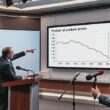A renewed sense of economic gloom is settling over Germany, according to a recent survey by the Institute for German Economy (IW), raising serious concerns about the nation’s labor market and investment climate. Following a brief respite observed in the spring of 2025, the IW’s survey, released Sunday, paints a picture of a private sector increasingly burdened by geopolitical headwinds and compounded by perceived domestic failings.
The survey reveals a stark shift in employer sentiment, with a worrying 36% of companies now planning job cuts for the coming year, compared to just 18% intending to create new positions. The manufacturing sector is particularly vulnerable, facing a bleak outlook with 41% of companies anticipating workforce reductions and only about one in seven anticipating job growth. This contraction risks undermining efforts to modernize Germany’s industrial base and address chronic skill shortages.
The decline in optimism is also manifesting in a substantial freeze on investment. Only 23% of businesses plan to increase investment in 2026, while 33% intend to reduce spending. This marks an intensification of a developing investment crisis, representing the longest period of negative investment expectations recorded by the IW’s economic survey since nationwide assessments began. Economists warn that this pullback in capital expenditure will stifle innovation and further hamper long-term growth.
Regional disparities are significant. While businesses in the northern and Bavarian regions express cautious optimism, anticipating potential production increases, the overall national mood is pessimistic. Notably, northeastern Germany faces a particularly dire forecast, with nearly half of surveyed companies anticipating reduced output and only a small minority expecting improved business conditions.
“Instead of driving a transformative economic shift, we’ve seen job cuts driven by substantial geopolitical stress” stated Michael Grömling, an IW economist. Grömling emphasized that these external pressures are being exacerbated by self-inflicted wounds – specifically, high costs related to energy, social security contributions and bureaucratic burdens. He cautioned that unless the government implements fundamental reforms, the effectiveness of its multi-billion euro stimulus packages will be increasingly questionable, failing to deliver a meaningful and necessary impact on Germany’s economic trajectory. The increasingly bleak picture raises serious political questions about the government’s ability to address Germany’s competitive disadvantages and prevent a prolonged period of economic stagnation.





